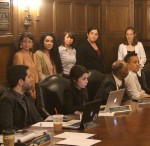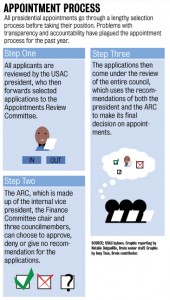The system of checks and balances is a concept we’re taught in middle school and yet our student government doesn’t seem to have a firm grasp on what it really means.
As it stands, the president of the Undergraduate Students Association Council has almost absolute power to make about 70 appointments to several campus committees without any significant checks.
Meanwhile, the body that is supposed to make recommendations to council about potential appointees, the Appointments Review Committee, doesn’t have enough influence over the appointment process.
Given that its bylaws mandate that many appointments be filled before the start of fall quarter, next year’s council should introduce a bylaw change to allow the committee to more adequately perform its duties. Limiting the power of the president and transferring some of it to the committee would achieve this goal.
As it stands, applications for appointed positions are forwarded by the president to the Appointments Review Committee, which is made up of the internal vice president, the Finance Committee chair and three sitting councilmembers appointed by the president.
Once the committee votes approve, disapprove or give no recommendation for each application, the president can forward them to the larger council table regardless of the result. Applicants are then asked simple questions at a regular weekly USAC meeting, a process that usually lasts less than 10 minutes.
The fact that the president can forward all applications to council regardless of the ARC’s recommendation renders the committee almost useless. A majority “yes” vote should not be a suggestion, but instead a requirement for applicant recommendations to be forwarded to the table, and likewise, a majority “no” vote should mean that the applicant never comes to the council table for consideration.
In another demonstration of excessive executive power, under the current bylaws the president can refuse to send applications to the committee without a stated reason. This kind of arbitration should be restricted to ensure that applications aren’t thrown out at the whim of a single councilmember, even if it’s the president. Vesting more power in the Appointments Review Committee would be a check on this kind of overstep.
The way the president handles the appointment process is up to the individual holding the office, and so this year’s president needs to quickly decide what he thinks is the most equitable way to handle the process.
According to former Internal Vice President Avi Oved, David Bocarsly, the 2012-2013 USAC president, made a habit of forwarding all the applicants to council for consideration. Making sure all applications are released to the council for review regardless of the committee’s decision will prevent applicants from being unfairly eliminated.
Some of the council’s appointments this year have illuminated the need for these reforms.
The most high-profile USAC appointment was that of Anthony Padilla, the Election Board chair. Basic questioning revealed that he couldn’t name all the USAC offices or even the two slates that existed when he was appointed and that he had a tenuous grasp of the responsibilities that come with the position.
At least one more qualified candidate was overlooked in the appointment process. Applicant J.D. Zelman ran student elections at his community college, but Joanino chose to withhold his application because Zelman was in the same fraternity as Internal Vice President Avi Oved, and Joanino suspected the two had ties.
Earlier in the year, council raised eyebrows during another high-stakes appointment: Associated Students UCLA Board of Directors student member, a powerful position that comes with free tuition for the appointee. During the appointment process, Joanino ignored the Appointments Review Committee’s “no” recommendation for applicant Precious Elam and forwarded her to council for consideration anyway. Elam was then approved by council for her position.
The flawed nature of these appointments in particular reaffirms the need for reform of the broader system. An overhaul of the process can assure that USAC doesn’t allow a few missteps to become long-term, recurring problems.
Email Ghoogasian at aghoogasian@media.ucla.edu or tweet him @AramsOpinions. Send general comments to opinion@media.ucla.edu or tweet us @DBOpinion.

